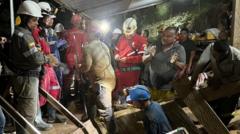Amid ongoing Israeli attacks, citizens of Tehran voice their fears and uncertainties regarding the escalating conflict. Many express a desire for peace while grappling with the trauma of war, fearing their city may become another war-torn landscape.
Voices of Tehran: Fear Amidst Conflict as Citizens Urgently Call for Peace

Voices of Tehran: Fear Amidst Conflict as Citizens Urgently Call for Peace
As Israel intensifies its strikes on Tehran, residents express deep fear and confusion, urging for their city to avoid the devastation seen in conflict zones like Gaza.
In the wake of intensified Israeli military actions on Tehran, the city’s residents are gripped by fear and confusion. Long queues at gas stations and bakeries signal the uncertainty permeating daily life, as many seek to escape a city under siege. Iranians recount sleepless nights amid a cacophony of missiles and panic, reflecting on the horrors witnessed in other conflict zones.
“I would rather die in my home than flee,” shared a 21-year-old music student on an encrypted app, expressing a blend of defiance and dread. Many residents, like her, are caught in a dual struggle against an oppressive regime and the unrelenting assaults from Israel. The young woman, who withheld her name, fears for her city's future, declaring fervently, "I don't want beautiful Tehran to become Gaza."
The harrowing toll is already evident, with over 220 casualties reported, many being innocent civilians, including women and children. Simultaneously, Israel reports casualties within its territory due to Iranian missiles. The absence of warning systems in Tehran amplifies the residents' anxiety, as missile strikes descend without notice.
Conflicting emotions weave through the civilian psyche. An initial thrill at the targeting of Iranian military figures quickly morphed into horror as news of civilian losses trickled in. “For the first time in my life, I started preparing myself for dying,” one woman voiced her feelings of helplessness.
With the Iranian government advising citizens to seek safety in mosques and metro stations, the futility of such suggestions becomes clear amidst sudden explosions. Tehran's geographical vastness offers little solace as every neighborhood feels the impact of warfare.
The emotional landscape is fracturing society. While some find solace in regime losses, others decry any support for foreign interventions. “The situation feels like the first hours after the Titanic hit the iceberg,” remarked another without naming herself. Families and communities sit divided, caught between the consequences of war and their political beliefs.
In these harrowing times, many Iranians have begun to prepare for the worst, gathering supplies and essentials, reflecting a deep-seated fear of an impending humanitarian disaster. Across the globe, the Iranian diaspora grapples with the weight of their loved ones' suffering, struggling to balance relief over regime losses with sorrow for civilian casualties.
As insecurity looms large, the unyielding call for peace resonates deeply among Tehran's residents. “We don't want our home to become another Iraq, Syria, or Afghanistan,” one activist articulated the shared sentiment of countless individuals. Every life impacted by this conflict, irrespective of political stance, illustrates a grim truth: freedom cannot be borne out of the devastation wrought by aerial strikes.



















